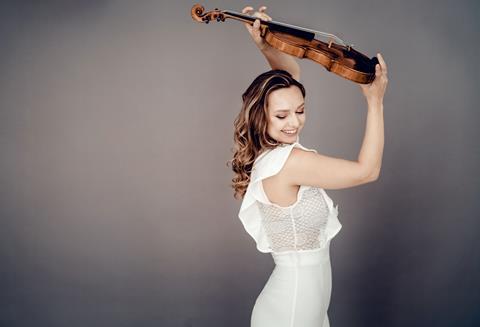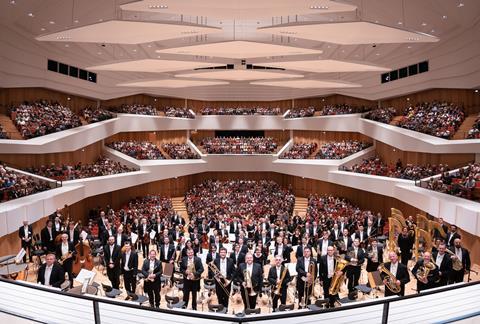Ahead of her debut tour with the Dresden Philharmonic, US violinist Maria Ioudenitch speaks to The Strad about her whirlwind journey from competition success to the start of a glittering performing career

Discover more Featured Stories like this in The Strad Playing Hub
Many will know Maria Ioudenitch’s name from a dazzling few years going from strength to strength. She won three major competitions in 2021 (it should be noted that she already had success as a talented violinist before then!), recorded her debut CD, Songbird, with Warner Classics and signed with Raab & Böhm both in 2022, and has gone on to create an exciting international performing career for herself since, including an upcoming debut tour with the Dresden Philharmonic. The tour runs from 15–21 April, beginning in London’s Cadogan Hall with Shostakovich’s mammoth Violin Concerto no.1, and continuing on to Birmingham, Cardiff, Bristol, Nottingham and Edinburgh. Ioudenitch talks to The Strad about her journey up until this point: the highlights, the inevitable pressures, and what she learnt along the way.
When did the idea to take part in the 2021 competitions first come about?
It was during the pandemic that I applied for them. Like a lot of people, I felt a bit hopeless and was wondering what would come next. And I knew from my father’s experience with winning the Cliburn Piano Competition, that competitions can really open doors. So I thought, let’s try it!
What were the highlights of this competition experience?
The audiences were so wonderful. They give you energy when you’re on stage, and it really didn’t feel like a competition, especially the Joachim Competition. It just felt like a celebration of music. And the stages of the competition were very rewarding. You don’t just have one recital and that’s it – you play in a quartet, lead an orchestra, play with orchestra and play solo. It’s very good preparation for the real world; today’s musician has to do a bit of everything.
What difficulties did you encounter during that time?
You feel like you have to be your best at all times. So when you realise that music is subjective to a large degree, and then you feel like you have to be perfect, you start wondering what being perfect really means. Is it perfect for you? Is it perfect for the judges? And even then, each judge is different. There was a period where I was a little confused about what I had to be on stage. And maybe it’s cliché, but at the end of the day all you can do is be yourself. So the psychology behind it all could be difficult at times.
Ultimately you have to realise that the competition result is not who you are. Whether you receive a prize or not. Winning doesn’t mean you’re the best, and not receiving a prize doesn’t mean you’re the worst. If one feels really a lot of love and passion for this, then just keep trying, because there will always be someone who loves what you do and believes in you.
Was the record deal following the Joachim Competition somewhat of a launch point for your post-competition performing career?
It was one part of it. With the record deal, it helped bring me into that mindset of, ‘Ok, this is really the start of something’. And with the help of mentors and guardian angels, a lot of puzzle pieces came together and a huge part of that was signing a contract with a management agency. You can have an album, but that doesn’t immediately give you concerts. Having a team has been incredible. It’s worth noting though, that there are many fantastic musicians who pave their own way without an agency. There’s not a single path to a career in music. Especially nowadays!
What was your experience of the transition from competition to performing career?
Now that I have a couple of years to look back on it, I think I was thrust into a new world. But at the time it felt natural – finally I could play concerts! It was definitely a learning curve. For example, having to plan recital programmes two seasons in advance. How do you even do that!? And then structuring my practice schedule to be able to focus on the right pieces that are coming up. And because I’m overexcited about coming up with these programmes (it’s one of my favorite creative processes!), I had to quickly realise that I can’t only be playing new pieces! It’s a lot forward thinking that I hadn’t done before.

What did you learn during the process of recording the CD?
It’s similar to psychological aspects of competitions we were talking about before. Perfection is not ideal. Whenever I tried to be perfect when recording, whether that meant hitting a shift, having a good tone or intellectual considerations, then it didn’t sound great. There’s a reason for that: because the priority was being taking away from making music. The biggest lesson I got from that was to take risks and to let go of control sometimes.
Since then, you have gone on to perform with major orchestras and in renowned venues. Was that daunting? How did you deal with that pressure?
Absolutely, incredibly daunting! Looking back, I realise that I was in such a ‘prepare’ mode that I didn’t even realise how crazy this experience was. Regarding how to deal with it, I think you need to have faith in the work that you do. And of course, giving 150 per cent in the practice room. Prepare the best you can and then leave to things to chance and risk.
What are a few things you’ve learnt during this time working with so many orchestras?
There’s always something to learn in each rehearsal and concert. The orchestra is such a big entity and I can’t really play delicately at times. I had to learn that you’re not giving up anything by playing louder. It’s another skill to know how to create a magical colour in a healthy piano instead of pianississimo, while still keeping the same character. And I’m still learning that.
What are you looking forward to with this debut tour?
I’m so looking forward it! Firstly, to meet Dresden Philharmonic. They’re incredible, and I can’t wait to make music with them and see how it feels. I’m really looking forward to all the cities and beautiful halls. Of course, also collaborating with Stanislav Kochanovsky, with whom I’ve already worked with in October. I’ve never had to experience the kind of stamina needed in a tour, so I’m also preparing for that!
What are you most excited about with the tour?
This is only the second time I’m playing the Shostakovich Concerto, and it’s such a ghostly, consuming, and brutal piece. It really takes a huge amount of guts, and I’m so looking forward to feeling all the energy around me in the orchestra.
Find more information about the upcoming tour here
Read: ‘I am striving to sound like a voice’ - Session Report: Maria Ioudenitch
Listen: The Strad Podcast Episode #34: Maria Ioudenitch on her competition success
Discover more Featured Stories like this in The Strad Playing Hub
The number one source for playing and teaching books, guides, CDs, calendars and back issues of the magazine.
In The Best of Technique you’ll discover the top playing tips of the world’s leading string players and teachers. It’s packed full of exercises for students, plus examples from the standard repertoire to show you how to integrate the technique into your playing.
The Strad’s Masterclass series brings together the finest string players with some of the greatest string works ever written. Always one of our most popular sections, Masterclass has been an invaluable aid to aspiring soloists, chamber musicians and string teachers since the 1990s.
American collector David L. Fulton amassed one of the 20th century’s finest collections of stringed instruments. This year’s calendar pays tribute to some of these priceless treasures, including Yehudi Menuhin’s celebrated ‘Lord Wilton’ Guarneri, the Carlo Bergonzi once played by Fritz Kreisler, and four instruments by Antonio Stradivari.













































No comments yet